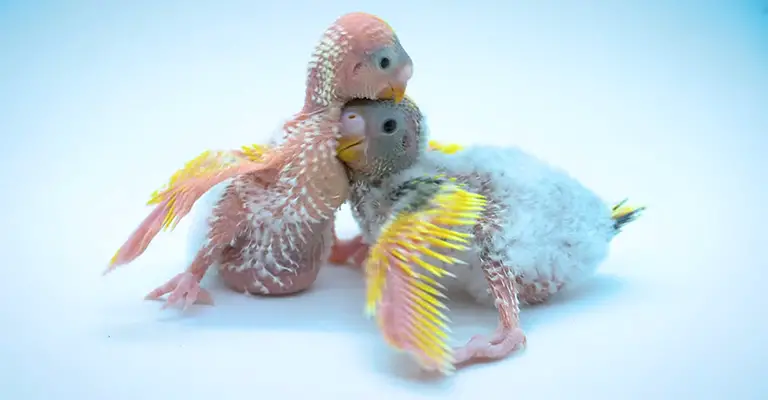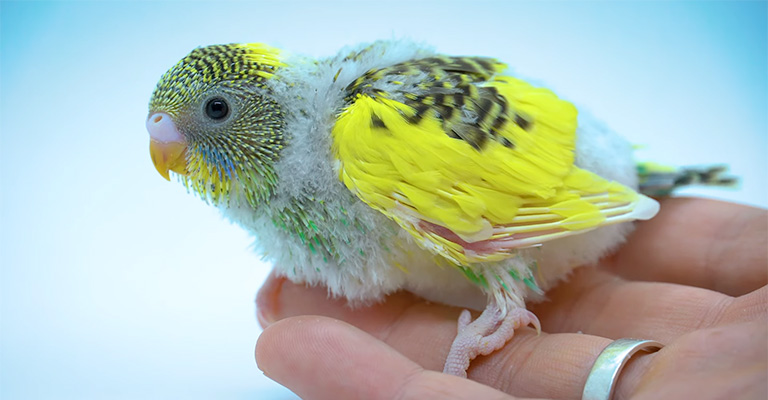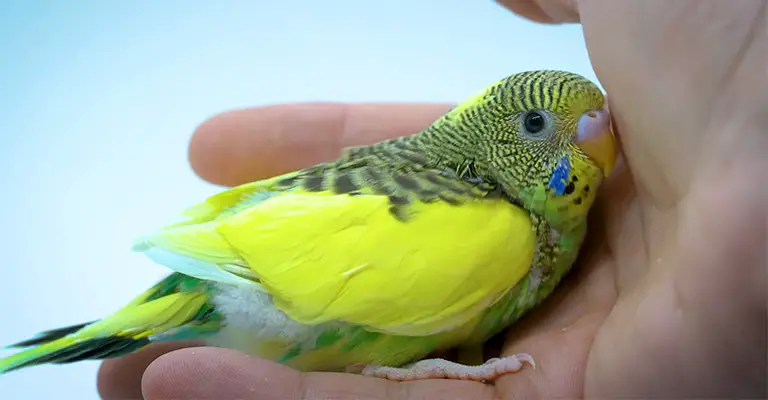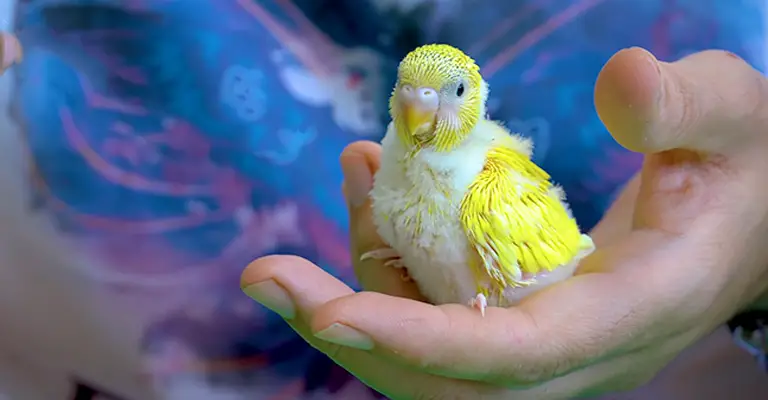The enigmatic world of avian companionship often presents us with puzzles to solve, and one such question that perplexes many bird enthusiasts is, “Why doesn’t my baby budgie sleep at night?”
The nighttime restlessness of a young budgie can be a source of concern for caregivers who wish to provide a comfortable and nurturing environment.
The reasons behind this behavior are multifaceted, ranging from adjustment challenges and diet considerations to temperature fluctuations and nocturnal habits.
By delving into the intricacies of a baby budgie’s sleep patterns, we can unravel the factors that might contribute to their nighttime wakefulness.
Armed with insights into their unique needs and behaviors, we can then implement strategies to encourage peaceful and restful nights for these delicate feathered companions.

Why Doesn’t My Baby Budgie Sleep At Night?
A baby budgie’s sleep patterns can be influenced by various factors, leading to nighttime restlessness.
Understanding these reasons can help you create a more conducive sleep environment for your young budgie. Here are some potential reasons why your baby budgie might not be sleeping well at night:
Adjustment Period
Young budgies might take time to adjust to their new environment. Changes in surroundings, noises, or lighting can disrupt their sleep routine as they acclimate to their surroundings.
Diet and Hunger
If your baby budgie is not getting enough nourishment during the day, it may wake up at night due to hunger. Ensuring a proper diet and meal schedule can alleviate this issue.
Temperature Fluctuations
Budgies are sensitive to temperature changes. If the temperature drops at night, your budgie might wake up due to discomfort. Maintain a consistent and comfortable temperature in their sleeping area.
Inadequate Sleep Area
An uncomfortable or ill-fitting sleeping area can cause restlessness. Ensure that the cage is appropriately sized, cozy, and quiet to provide a secure sleep space.
Nocturnal Habits

Baby budgies, like other birds, might be more active during dawn and dusk, which can lead to wakefulness during these periods.
Stress or Anxiety
Changes in the environment, new additions, or lack of socialization can induce stress and anxiety, affecting sleep. Creating a calm and familiar environment can help alleviate this.
Lack of Routine
Establishing a consistent sleep routine is crucial for budgies. Inconsistencies in sleep and wake times might lead to disrupted sleep patterns.
Health Concerns
Underlying health issues, such as infections or discomfort, can disrupt sleep. Observe your budgie for any signs of illness and consult a veterinarian if necessary.
Noise and Disturbances
External noises, household activity, or bright lights can interfere with your budgie’s sleep. Providing a quiet, dimly lit sleeping environment can encourage better sleep.
Creating a comfortable and nurturing sleep environment, maintaining a consistent routine, and addressing any potential health or behavioral issues can greatly improve your baby budgie’s sleep at night.
Observing their behavior, making adjustments, and consulting an avian veterinarian if problems persist can ensure that your budgie gets the rest it needs for optimal health and well-being.
What To Do For My Baby Budgie Put To Sleep At Night?

There are some things you can do to help your baby budgie sleep better at night. Here are some tips:
Follow A Regular Sleep Schedule
You should try to keep your baby budgie’s sleep cycle consistent and in sync with the natural day and night cycle. You should put your baby budgie to bed at the same time every night and wake it up at the same time every morning.
You should also avoid disturbing your baby budgie’s sleep by turning on the lights, making loud noises, or handling it during the night.
Create A Dark And Quiet Environment
You should make sure that your baby budgie’s cage is in a dark and quiet place at night, away from any sources of light or noise that might keep it awake or interrupt its sleep.
You can use a night light or cover its cage with a thin cloth that allows some light to pass through, as this can help your baby budgie feel more secure and comfortable in the dark.
Provide Your Baby Budgie With A Cozy Nest Or A Soft Blanket
You should give your baby budgie something to snuggle with or cuddle into at night, such as a cozy nest, a soft blanket, or a plush toy. This can help your baby budgie stay warm and cozy and reduce its stress or anxiety.
You should make sure that the nest or blanket is clean, dry, and bird-safe and that it does not pose a choking or suffocation hazard for your baby budgie.
Feed Your Baby Budgie Well Before Bedtime
You should make sure that your baby budgie has enough food and water before you put it to bed, as this can prevent it from waking up hungry or thirsty during the night.
You should follow a proper weaning schedule for your baby budgie and offer it a balanced and varied diet that includes pellets, seeds, fruits, vegetables, and nuts that are suitable for its species.
Play With Your Baby Budgie During The Day
You should spend some quality time with your baby budgie during the day, playing games, teaching tricks, or talking to it. This can help your baby budgie burn off some energy, stimulate its mind, and strengthen your bond.
This can also help your baby budgie feel more tired and sleepy at night and improve its sleep quality and quantity.
Avoid Any Stressors Or Changes That Might Affect Your Baby Budgie’s Sleep
You should try to keep your baby budgie’s environment and routine stable and familiar and avoid any changes that might cause it to feel stressed or anxious.
For example, you should not move its cage to a new location, introduce new people or pets, or change its diet or bedding without giving it time to adjust.
Check Your Baby Budgie For Any Health Issues That Might Affect Its Sleep
You should monitor your baby budgie’s health and behavior regularly and look for any signs of illness or injury that might affect their sleep.
For example, you should check if your baby budgie has mites or other parasites that are irritating its skin or feathers or if it has any respiratory problems that are making it difficult to breathe.
You should take your baby budgie to the vet if you notice any abnormal symptoms or behaviors.
Use A Bird-Safe Calming Product To Help Your Baby Budgie Relax
There are some products that are specially designed to help birds calm down and sleep better, such as Avian Calm or Avitech AviCalm.
These products contain natural ingredients such as chamomile, lavender, or L-theanine, which can reduce stress and anxiety in birds.
You can follow the instructions on the label and give your baby budgie a small dose of the product before bedtime.
Consult Your Vet For Professional Advice
If none of the above tips work, you might need to consult your vet for professional advice on how to help your baby budgie sleep better at night.
Your vet can examine your baby budgie and run some tests to determine the cause of its sleep problem.
Your vet can also prescribe any medications or treatments that might help your baby budgie sleep better.
How Do I Know If My Baby Budgie Is Not Getting Enough Sleep?

Sleep is very important for your baby budgie’s health and well-being. If your baby budgie is not getting enough sleep, it might show some of the following symptoms:
Irritability And Aggression
Your baby budgie might become more cranky and nippy if it is sleep-deprived and might bite or attack you or other birds. It might also become more territorial or defensive of its cage or toys.
Lack Of Appetite And Weight Loss
Your baby budgie might lose interest in food and water if it is not sleeping well and might eat less or refuse to eat at all.
This can lead to weight loss and malnutrition, which can affect its growth and development.
Weakness And Lethargy
Your baby budgie might feel tired and sluggish if it is not getting enough sleep and might spend more time resting or sleeping during the day. It might also have less energy and enthusiasm for playing, exploring, or learning.
Poor Feather Condition And Appearance
Your baby budgie might have dull, dirty, or ruffled feathers if it is not sleeping well, as it might not have enough time or motivation to preen or groom itself. It might also have dark circles or bags under its eyes or a droopy posture.
Lowered Immunity And Increased Susceptibility To Illness
Your baby budgie might have a weaker immune system if it is not sleeping well and might be more prone to infections, diseases, or parasites.
It might also have difficulty healing from injuries or wounds.
Impaired Cognitive And Behavioral Functions
Your baby budgie might have trouble learning, remembering, or solving problems if it is not sleeping well, as sleep is essential for brain development and memory consolidation.
It might also have difficulty communicating, socializing, or bonding with you or other birds.
Changes In Vocalization Patterns
Your baby budgie might vocalize more or less than usual if it is not sleeping well, depending on its personality and mood.
It might sing, chirp, or talk more to keep itself awake or entertained, or it might be quieter or more subdued than normal.
Changes In Activity Levels
Your baby budgie might be more active or restless at night if it is not sleeping well and might try to keep itself busy by playing with its toys, moving around its cage, or making noises.
Alternatively, it might be less active or more sleepy during the day and might nap more often or longer than usual.
Changes In Sleep Habits
Your baby budgie might have difficulty falling asleep or staying asleep at night if it is not sleeping well and might wake up frequently or earlier than normal.
It might also have irregular sleep cycles or patterns, such as sleeping too much or too little.
FAQ
There are several reasons why baby budgies might have trouble sleeping at night. These can include adjustment to a new environment, hunger, discomfort, temperature changes, stress, or irregular routines.
Identifying the specific cause can help you address the issue and create a more suitable sleep environment.
Yes, hunger could be a factor. Baby budgies have high metabolisms and may need frequent feeding.
Ensure they have adequate nutrition during the day to prevent hunger-related wakefulness at night.
Consistency is key. Set regular sleep and wake times for your budgie. Dim the lights in their sleeping area at night and ensure a quiet, peaceful environment to encourage restful sleep.
Yes, stress can disrupt sleep. Changes in environment, loud noises, or lack of socialization can induce anxiety.
Creating a calm and predictable environment can help alleviate stress-related sleep disturbances.
Yes, budgies, including babies, are naturally more active during dawn and dusk. These periods correspond to their natural activity cycles.
Expect them to be more awake and energetic during these times while adjusting their sleep patterns accordingly.
Conclusion
In the realm of avian care, understanding the nuances of sleep patterns in baby budgies holds the key to fostering their overall well-being.
The question of why a baby budgie doesn’t sleep at night highlights the significance of creating a supportive sleep environment.
Through a combination of consistent routines, a proper diet, and a peaceful sleeping space, caregivers can guide these young budgies toward healthier sleep habits.
As we address factors such as stress, health concerns, and nocturnal behaviors, we bridge the gap between our world and theirs, ensuring that their restful nights contribute to their growth, vitality, and joyful presence in our lives.
By tending to their sleep needs, we deepen the bond of companionship, enabling both budgie and caregiver to find harmony within the rhythms of nature.